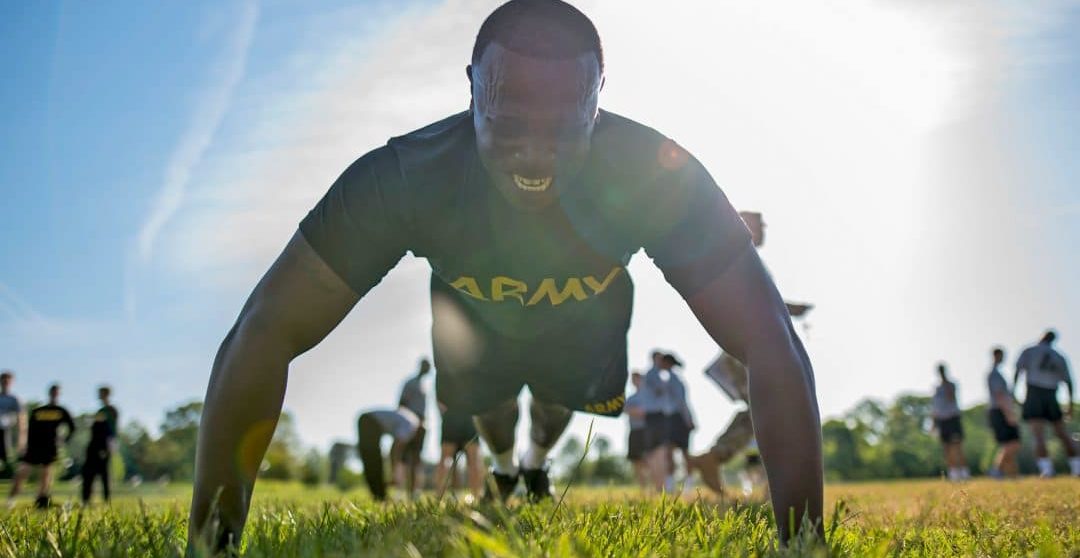Mental and physical preparation is key to success for those heading to basic training. Regardless of what branch you are enlisting in, basic training will present many physical challenges. Preparing your body now will help you be more successful when encountering the challenges of basic training.
Begin your journey to basic training with Master Fitness Trainer, and performance enhancement specialist, Tina. Whether you’re a few weeks away from shipping out, or a couple of months it’s never too early or late to begin your physical journey. It’s time to get savage with Master Fitness Trainer, Tina, and start preparing for basic training.
Down through the years, the approach to physical training within the military has evolved to coincide with the tactical requirements of the role of the modern-day soldier. The Army of our predecessors was a different Army than the one in which you have enlisted.
I come from a long line of military men and women, who have all served in combat in some capacity. My Great grandfather served in WWI and received medals for valor, my grandfathers and uncles served in WWII, and one of my uncles (the only non-Army member of my family) was a Navy Corpsman injured at Pearl Harbor. My father served as an Army Drill Sergeant and served in Korea. One of my older brothers (whom I never got to meet) served and died in Vietnam and another served in Desert Storm.
Each specific job in the military requires a different approach to physical training. The physical demands will vary for each job. It is the responsibilit of each individual to maintain a certain level of physical fitness.
Certain times of year always inspire a great interest in the military. Memorial Day, Independence Day, anniversaries of great battles, such as the beach landings at Normandy and the Battle of Britain, the anniversary of 9/11, all come to mind.
Although some may be interested in the history, as a fitness enthusiast, I am more concerned with how we can become strong as those who fight for our nation and ensure that we keep and protect the freedoms to which we have become accustomed.
You’re getting a chance to learn and perform an Army Master Fitness’s 6-week program for a Special Forces operative.
Note: Only intense workout days are listed here. Do weight training or swimming workouts on your “easy” or “off” days.
Week One Workout
Day One:
Fitness Test/Sit and reach flexibility test as follows: Record your numbers/times for future reference.
Push-ups: Maximum in 60 seconds
Sit-ups: Maximum in 60 seconds
Pull-ups: Maximum in 60 seconds
Run: 2 miles as fast as possible
Swim: 100 meter nonstop using any stroke, without touching the side or bottom of the pool.
Forced march with 30-pound rucksack: While carrying 30 pounds in a backpack, walk 3 miles in 45 minutes on a road or 1 hour if walking cross-country. Wear well broken-in boots with thick socks.
Day Two:
Push-ups: 3 sets of maximum in 30 seconds
Run: 3 miles at moderate 8-9 minute mile pace
Rope climb or pull-ups: 3 sets to failure
Day Three:
Forced march with 30-pound rucksack: 5 miles in 1 hour and 15 minutes (along the road) or 1 hour and 40 minutes (cross-country).
Week Two Workout
Day One:
Forced march with 30-pound rucksack: 5 miles in 1 hour and 15 minutes (along the road) or 1 hour and 40 minutes (cross-country).
Day Two:
Push-ups: 3 sets of maximum in 35 seconds
Pull-ups: 3 sets of maximum in 35 seconds
Sit-ups: 3 sets of maximum in 35 seconds
Run: 5 miles at moderate 8 to 9 minute mile pace
Squats: 3 sets of 50 reps with 35 pound rucksack
Day Three:
Forced march with 35-pound rucksack: 10 miles in 3 hours (along a road) or 4 hours (cross-country).
Week Three Workout
Day One:
Push-ups: 4 sets of maximum in 40 seconds
Pull-ups: 4 sets of maximum in 40 seconds
Sit-ups: 4 sets of maximum in 40 seconds
Run: 4 miles at moderate to fast 7 to 8 minute mile pace
Squats: 4 sets of 50 reps with 40 pound rucksack
Day Two:
Forced march with 40-pound rucksack: 12 miles in 4 hours (along a road) or 4 hours and 40 minutes (cross-country).
Day Three:
Push-ups: 4 sets of maximum in 45 seconds
Pull-ups: 4 sets of maximum in 45 seconds
Sit-ups: 4 sets of maximum in 45 seconds
Run: 6 miles at moderate to fast 7 to 8-minute mile pace
Squats: 4 sets of 50 reps with 40-pound rucksack
Week Four Workout
Day One:
Forced march with a 50-pound rucksack: 14 miles in 4 hours (along a road) or 4 hours and 40 minutes (cross-country).
Day Two:
Push-ups: 4 sets of maximum in 60 seconds
Pull-ups: 4 sets of maximum in 60 seconds
Sit-ups: 4 sets of maximum in 60 seconds
Run: 6 miles at moderate to fast 7 to 8 minute mile pace
Squats: 4 sets of 50 reps with 50 pound rucksack
Day Three:
Forced march with a 50-pound rucksack: 18 miles in 4 hours and 45 minutes (along a road) or 6 hours (cross-country).
Week Five Workout
Day One:
Run: 3 miles at a fast 6-7 minute mile pace.
Swim: 500 meters nonstop swim, using any stroke but backstroke.
Day Two:
Fitness Test
Sit and reach flexibility test.
Push-ups: Maximum in 60 seconds
Sit-ups: Maximum in 60 seconds
Pull-ups: Maximum in 60 seconds
Run: 2 miles as fast as possible
Day Three:
Forced march with a 50-pound rucksack: 18 miles in 4 hours and 30 minutes (along a road) or 6 hours (cross-country).




